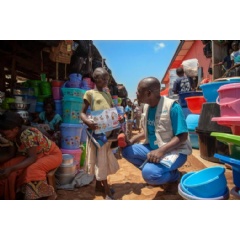Geneva Palais briefing note on the impact of the Ebola outbreak on children in the Democratic Republic of the Congo
This is a summary of remarks by Jerome Pfaffman, UNICEF Senior Health Specialist – to whom quoted text may be attributed – at today’s press briefing at the Palais des Nations in Geneva

I’ve just finished my third deployment to the northeast of the Democratic Republic of the Congo (DRC). When it started I did not think I would have to come before you today to ask for more support. Several times we were very close to having this outbreak under control. Or so we thought.
This Ebola response is far more complex because it is in an active conflict zone. People living in North Kivu and Ituri are facing a public health emergency and a humanitarian crisis at the same time.
Both provinces, for example, are also facing a major measles outbreak. In Ituri, about half of the health facilities have been damaged or destroyed during fighting over the past two years. There is mass displacement. We have just completed a first vaccination campaign in the provincial capital, Bunia, where we vaccinated more than 40 000 children against measles. But we need to vaccinate far more children, against the full array of diseases, in order to protect them from all the public health risks they are exposed to.
This is why the new strategic response plan includes both an intensification of the public health response, and a whole program to address acute humanitarian and social needs.
UNICEF will need to triple its budget to respond to this complex crisis. This includes about 70 million dollars for epidemic control activities, 30 million to build community capacities in at-risk areas, and another 70 million to deliver essential services.
Colleagues and communities are fighting the outbreak tirelessly but we desperately need the international community to back us up.
As of July 28, there were 2,671 confirmed cases, including more than 700 children (718), more than half of them (57%) below 5 years old. It is unprecedented to have this proportion of children affected in an Ebola outbreak.
Twelve new confirmed cases were reported the day I left DRC. Five were alive and will be able to access treatment, but seven had died in the community. This is bad. Having this number of community deaths means we’re not ahead of the epidemic.
We cannot defeat this outbreak unless communities are fully mobilized. They are best able to do the things that matter in terms of curbing the spread of disease -- contact tracing, household decontamination as well as provide safe and dignified burials.
We are two days before the one-year milestone of the Ebola outbreak in DRC. This is a wake-up call. There must not be a second-year milestone.”
( Press Release Image: https://photos.webwire.com/prmedia/6/244590/244590-1.jpg )
WebWireID244590
This news content was configured by WebWire editorial staff. Linking is permitted.
News Release Distribution and Press Release Distribution Services Provided by WebWire.